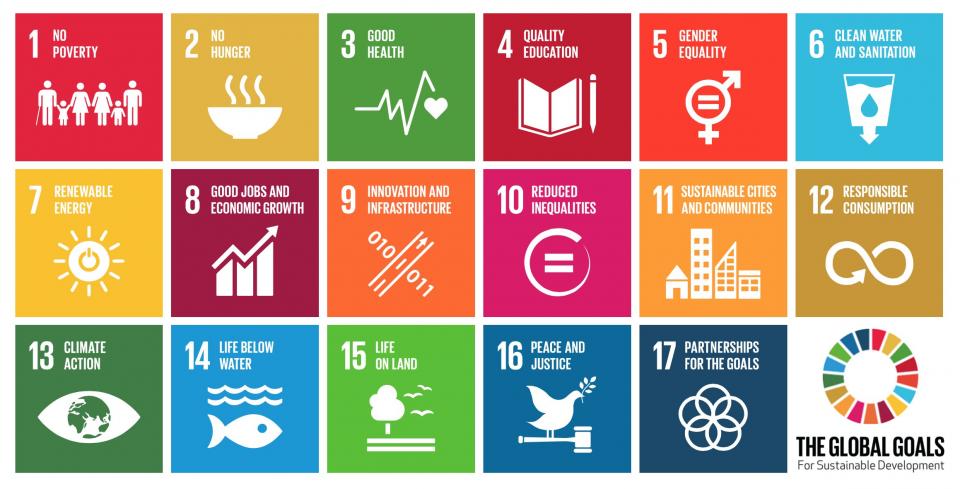Over the past year and a half, the Sustainability Council and University of Alberta International have been working together to discuss how we could bring more focus on the university’s efforts related to the UN’s Sustainable Development Goals (SDGs). The SDGs outline a path towards a more sustainable and equitable future for all of humanity, and the University of Alberta has a big role to play in this—from advancing research on complex problems to preparing future generations to lead the transition to a better world for all.
Early on in this process, it became clear that the university was already a strong actor in terms of advancing the SDGs. Through all of our collective initiatives, including the Sustainability Council’s annual Sustainability Awareness Week and UAI Global Education’s series of 17 minute Global Goals talks, we were well aware that there were a lot of courses and a lot of research being done on this campus related to the SDGs. Through our partnership with Energy Management and Sustainable Operations (EMSO), we also knew that the university itself was a leader on many sustainability initiatives in our own operations.
With this knowledge, Vice-Provost & Associate Vice-President (International) Cen Huang and I decided to put forward the University of Alberta for consideration in the Times Higher Education’s Impact Rankings. Now in its third year, the Impact Rankings assess how a university’s research, outreach and stewardship contribute towards the achievement of the SDGs.
With only six weeks to the application deadline, a small team from the Sustainability Council and University of Alberta International, with support from EMSO, got to work gathering data. Nada, Sara and John reached out to over 100 colleagues on all campuses to find out how their faculties, schools, departments, institutes, and operational units were working to end poverty, reduce inequality, spur prosperity and protect the planet. We were really amazed to learn of all of the tremendous work that our colleagues are quietly undertaking in their labs and offices across campus (and indeed around the world!).
In the end we are delighted to have been ranked 64th in the world. This mapping revealed an incredible picture for the University of Alberta’s positive impact on the world. Without having connected with so many people, and without mapping it out goal-by-goal, I don’t think we really could have understood the depth and richness of our collective SDG contributions.
A few key highlights include our ranking of 16th in the world in working towards achieving Goal 2 to eliminate hunger. Many factors contributed to this, one that I found quite interesting was our Dairy Research and Technology Centre, another of which is the Campus Food Bank, a leader in helping eliminate hunger within the university community. We were 14th in the world at contributing to Goal 15 promoting life on land thanks to outreach programs like the Botanic Gardens’ Green School, the Department of Biological Sciences Lecture Series, and Augustana’s publicly available course on biodiversity conservation.We were also 30th in the world for Goal 14 promoting life below water thanks to research programs like Tracking Change that engage with Northern and Indigenous communities.
The Department of Political Science’s annual Hurtig Lecture was a factor of our being ranked 42nd in the world on Goal 16 for the promotion of peace, justice, and strong institutions. Placing 47th in Goal 11 for creating sustainable cities and communities was supported by the North Campus Open Space Plan and the Affordable Housing Solutions Lab.
Other results affirm our established strengths, but are certainly helpful for clarifying our reputation with international students and potential faculty members. For instance, bucking the perception outside of Alberta, we produced over 30,000 citations for roughly 1,400 research papers related to goals 7 and 13, which relate to clean energy climate action. The Impact Rankings help show the world the incredible, interdisciplinary work that is happening inside Future Energy Systems and other areas.
I am confident that many of you are working in one way or another towards the SDGs and can find something useful in the Impact Rankings. After all, we all know our mission to “discover, disseminate, and apply new knowledge for the benefit of society,” that we are working “for the public good.” The Impact Rankings demonstrate our contribution to these goals by measuring the good our work brings. Please take a look at the results and explore our related activities at uab.ca/sdg. We look forward to connecting with many of you as we begin to work towards our next submission.

About Robert
Robert Summers is Academic Director of the Sustainability Council. He is also Associate Director of the School of Urban and Regional Planning, a program which he helped establish in 2012. His research focuses on roadblocks to systemic change, which he has studied by looking at water supplies in Malawian villages and at neighbourhood revitalization efforts in Edmonton. He tweets @RJSCity where he was briefly famous as “Bob from Calgary.”
